Ivo Blom found this series of French postcards of the 1910s. The publisher is unknown but we guess it was Pathé Frères while all the portrayed actors and actresses worked for Pathé in the 1910s. Most of the photos were taken by A. Bert or Félix, who both also worked for other postcard series by Pathé. The numbers on the cards double, so there were probably two or even more series.

French postcard, no. 1. Cliché Bert.
Charles Prince (1872-1933), aka just ‘Prince’, was a French film actor, director, and writer. He was famous for his countless comical shorts with his alter ego Rigadin.
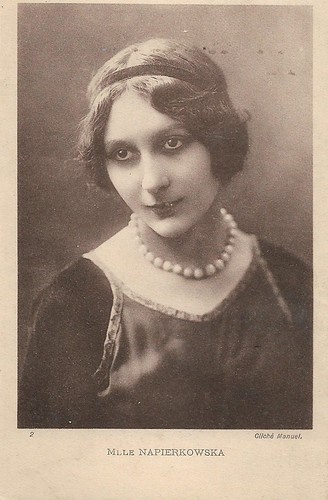
French postcard, no. 2. Cliché Manuel.
Exotic Stacia Napierkowska (1886-1945) was a fascinating star of the silent film era. The French actress and dancer is best remembered as the seductive but cruel Queen Antinéa in the classic fantasy L’Atlantide/Queen of Atlantis (Jacques Feyder, 1921). Between 1908 and 1926 she appeared in 86 films.

French postcard, no. 3. Cliché X.
André Deed (1879-1940) was one the most popular comedians in French and Italian silent cinema under the names of Boireau and Cretinetti. He also was a film director and scriptwriter.

French postcard, no. 4. Cliché Félix.
Andrée Pascal (1892-1982) was a French actress who was highly active in French silent cinema. She did over 30 films for Pathé in the early 1910s but suddenly stopped her film career after acting in L'empereur des pauvres (1922).
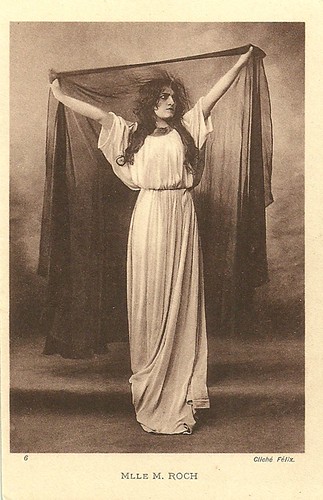
French postcard, no. 6. Cliché Félix.
Madeleine Roch (1883–1930) was a reputed French 'tragédienne' from the Comédie Française, who between 1909 and 1913 acted in a series of 11 Film d'Art-like historical films at Pathé Frères. These included the Tolstoy adaptation Résurrection (1909), Messaline (Ferdinand Zecca, Henri Andréani, 1910), Cléopâtre (Ferdinand Zecca, Henri Andréani, 1910), Moïse sauvé des eaux (Henri Andréani, 1911), Radgrune (Camille de Morlhon, 1911), and Une intrigue à la cour d’Henry VIII (Camille de Morlhon, 1911). Madeleine Roch entered the Comédie-Française in 1903 and was a Sociétaire there between 1912 and 1930. Her quitting of film acting in 1912 may have had to do with becoming a Sociétaire. She was in particular a performer of the plays of Jean Racine, such as 'Andromaque', 'Brittanicus', and 'Phèdre', and of Greek tragedy. At the open air Théâtre des Arènes in Béziers, she starred in e.g. 'Le premier glaive' (1908), 'La fille du soleil' (1909), 'Héliogabale' (1910), and 'Les esclaves' (1910). In 1930, Roch gave her last stage performance. She died that same year.
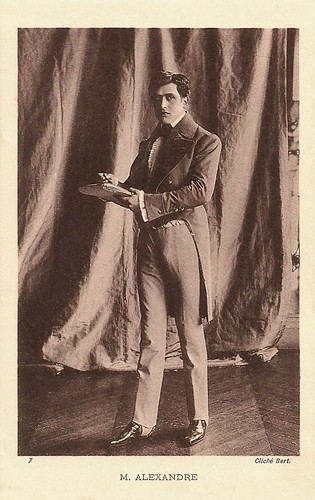
French postcard, no. 7. Cliché Bert.
René Alexandre (1885-1946) was a French actor of the Comédie-Française. Between 1909 and 1940 he acted in some 53 films, mainly in shorts by Pathé but also om Antoine’s rural drama La Terre (1921).

French postcard, no. 7. Cliché Boyer.
Louis Ravet (1870-1933) was a French stage and screen actor. Ravet, who first acted at the Théâtre des Bouffes du Nord and the Théâtre de l'Ambigu-Comique, was pensionnaire of the Comédie-Française from 1899 to 1919, playing in the classics by Corneille, Hugo, and most often, Racine.
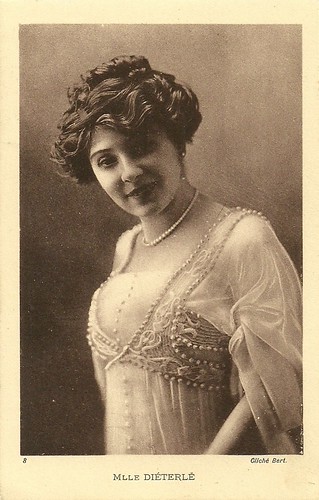
French postcard, no. 8. Cliché Bert.
Amélie Diéterle (1871-1941) was one of the most beloved actresses and singers of the Belle Epoque, who inspired poets and painters such as Mallarmé and Rodin. Between 1909 and 1913 she acted in some 27 shorts films at Pathé Frères: mostly Rigadin comedies directed by Georges Monca.
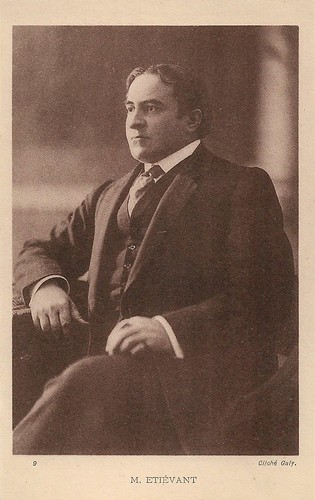
French postcard, no. 9. Cliché Gully.
Henri Étiévant (1870–1953) was a French actor, who started at Pathé Frères in 1908 and had a prolific career there until 1914, often - but not always - playing bad guys. In the four-part episode film Les misérables (Albert Capellani, 1913), he played Javert, the police commissioner pursuing Jean Valjean (Henry Krauss). In 1913, Henri Étiévant worked as a film director at Milano Films, in films with Pina Fabbri, Livio Pavanelli, and Thea Sandten. In 1913-1914, he also worked as a director in Germany for the company Vitascope, in films such as Pauline (1914), often with Sandten in the lead. Between 1915 and 1919, Henri Étiévant was absent from the sets, both as actor and director. In 1920 he retook his career as a director with the film Neuf. In the 1920s, he sporadically returned to the film sets but rather focused on directing, with films such as La fille de Camargue (1921) with Stacia Napierkowska and Charles Vanel, La fin de Monte-Carlo (1927) with Jean Angelo and Francesca Bertini, and La sirène des tropiques (codirected with Mario Nalpas, 1927) with Josephine Baker. With Nalpas he also co-directed his last film, the late silent film La symphonie pathétique (1930). He would still act in five sound films in the 1930s, such as the comedy La bande à Bouboule (Léon Mathot, 1931).
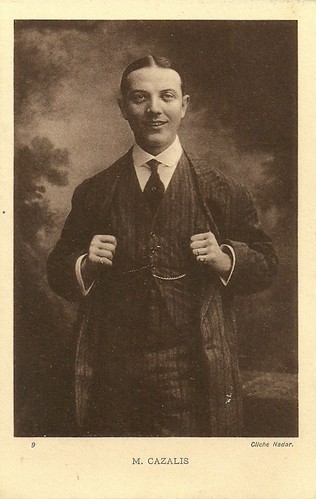
French postcard, no. 9. Cliché Nadar.
Lucien Cazalis (1878-1945) was a French stage and screen actor and singer. In the early 1910s, he was a popular Pathé comedian as the characters Jobard (1911) and Caza (1913-1916).
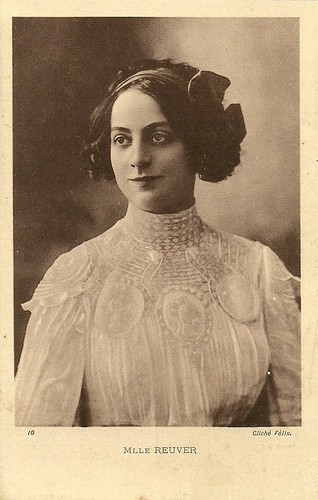
French postcard, no. 10. Cliché Félix.
Germaine Reuver (1885-1953) was a French actress, who acted in some 65 films between 1908 and 1953. Between 1909 and 1912, she often acted in the Rigadin comedies by Pathé. In the 1930s, she played many supporting parts in French sound cinema.
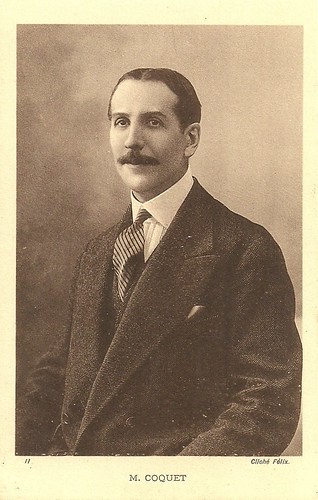
French postcard, no. 11. Cliché Félix.
Georges Coquet (?-?) was a French stage and screen actor. Coquet obtained his diploma at the Paris Conservatory in 1888. He first played classical stage roles, then moved over to vaudeville, and finally played at the Comédie-Française. After a first part in the Pathé thriller La main (1907), Coquet became a prolific Pathé actor between 1911 and 1914, mostly playing in comedies, e.g. those with Max Linder. He was married to Andrée Marly, with whom he also acted together in a number of Pathé shorts such as Deux vieux garçons (Michel Carré, 1911), Le Vase brisé (1912), Serment de fumeur (Camille de Morlhon, 1912), and À la française (1912). In 1912 René Leprince directed Coquet several times, such as in Le club des élégants and L'infidèle. Probably his last part Coquet had in the Gaumont comedy L'épreuve (Louis Feuillade, 1914), starring Renée Carl.

French postcard, no. 12. Cliché Félix.
Marie or Maria Ventura (1888-1954) was a Romanian-French actress and theatre director. She became well known in the silent cinema with her role in the popular serial Les misérables (1912). From 1919 till 1941, she worked at the Comédie-Française. In 1938, she directed 'Iphigénie' by Racine, becoming the first woman to direct a play at the Comédie-Française.
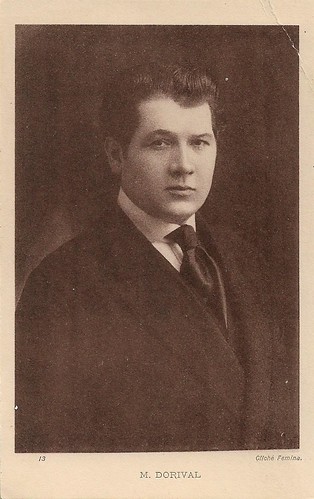
French postcard, no. 13. Cliché Femina.
Georges Dorival (1871–1939) was a French actor, who had a prolific career at Pathé Frères between 1909 and 1914, acting in 26 historical and modern dramas, such as Le bossu (André Heuzé 1912) and Rocambole (Georges Denola, 1914). In the 1920s he did only one film: Quatre-vingt-treize (André Antoine, 1921), in the 1930s five films.

French postcard, no. 13. Cliché Sartony.
Jean-Joseph-Dieudonné-Léonard Van den Kerckhove, known as Jacques Vandenne or simply 'Vandenne' (1864-?) was a French silent cinema actor, mainly at Pathé Frères. He was sometimes indicated as Maurice Vandenne.
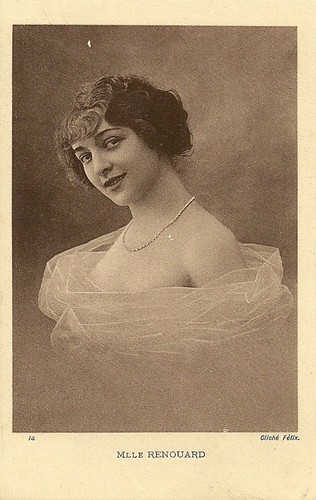
French postcard, no. 14. Cliché Félix.
Jane Renouardt aka Jane Renouard (1890–1972), born Victorine Catherine Renouard, was a French actress of the silent screen. She played Jane, the partner of Max Linder, in many of his short comedies for Pathé Frères. During the First World War, she acted in various feature films, such as the pantomime L'Enfant prodigue (Michel Carré, André Wormser, 1916) with Cécile Guyon as Pierrot and Renouardt as 'his' beloved Phrynette, and the tragedy Clown/Le Clown (1917) by and starring Maurice de Féraudy, as an old clown who kills himself for his son (René Rocher). In 1919 Renouardt did her last film, En quatrième vitesse (Marcel Simon, 1919). She was the first manager of the Theater Danou, which opened in 1921. In 1936 she married the actor Fernand Gravey.
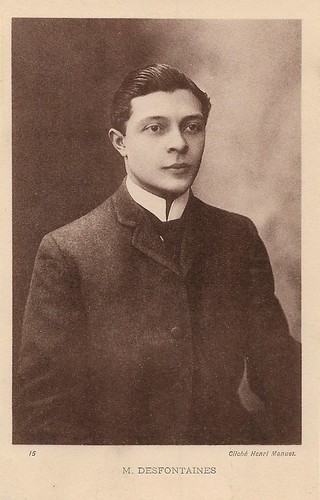
French postcard, no. 15. Cliché Félix.
Henri Desfontaines (1876–1931) was a prolific actor and director at Pathé Frères between 1909 and 1914, mostly with historical or contemporary dramas. All in all, he acted in 37 films between 1908 and 1920 (plus two early sound films) and directed 61 films between 1908 and 1928. While initially rather acting in films directed by Albert Capellani, he soon became a prolific director as well. In the early 1910s, Desfontaines often co-directed Film d'Art dramas such as L'assassinat d'Henri III (with Louis Mercanton, 1911), Madame Sans-Gêne (with André Calmettes, 1911) with Réjane, Les amours de la reine Élisabeth/Queen Elizabeth (with Mercanton, 1912) starring Sarah Bernhardt, Adrienne Lecouvreur (with Mercanton, 1913) again with Bernhardt, and Anne de Boleyn (with Mercanton, 1914). Probably his first feature-length film was La reine Margot (1914), starring Léontine Massart as Marguerite of Valois, Desfontaines as king Charles IX, Jeanne Grumbach as Catherine de Medici, and Paul Numa as Henri of Navarra. From 1920 onward, Desfontaines focused on film directing, such as L'espionne aux yeux noirs (1926) with Maria Dalbaicin, and Belphegor (1927) with René Navarre.
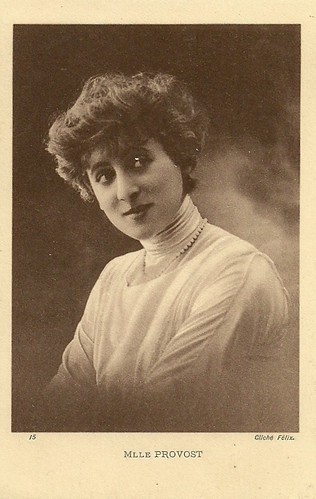
French postcard, no. 15. Cliché Henri Manuel.
Jeanne Provost (1897-1980) was a member of the Comédie-Française only between 1907 and 1912, and she would act in some 25 silent and sound films.

French postcard, no. 16. Cliché Bert.
French stage and screen actor Valentin Pierre Louis MacLeod is better known as Georges Grand (1864-1921). He was first acclaimed for his work with André Antoine before becoming a reputed member of the Comédie-Française. Grand also acted in 11 modern and historical dramas by Pathé Frères.
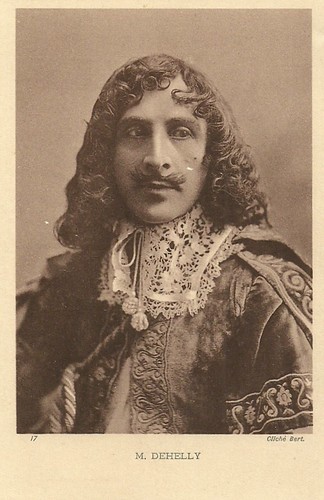
French postcard, no. 17. Cliché Bert. Émile Dehelly as D'Artagnan in Les trois mousquetaires (Henri Pouctal, 1913), based on Alexandre Dumas' famous novel.
Émile Dehelly (1871-1969) was a French stage and screen actor, who was a sociétaire of the Comédie-Française (1903-1928) and had a prolific career at Le Film d’Art between 1909 and 1913. He is the father of film actor Jean Dehelly (1896-1964).

French postcard, no. 19. Cliché Félix.
Andrée Marly (?-?) had a short but intense film career in the years 1909-1916, mostly acting in short comedies and dramas by Pathé. She was married to the actor Georges Coquet.
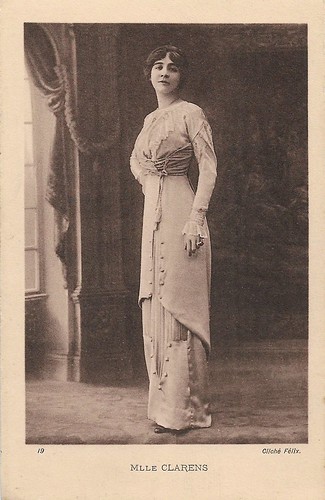
French postcard, no. 19. Cliché Félix.
Juliette Clarens (1887–1978) was a French actress who acted in some 35 films between 1910 and 1920. In 1910-1914, she played in many comedies, e.g. with Rigadin, and dramas at Pathé Frères. In Louis Feuillade's crime serial Judex (1916) she played Gisèle. In Henri Pouctal's Zola adaptation Travail (1920) she was Suzanne.
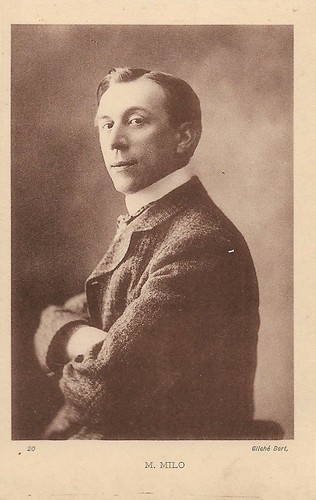
French postcard, no. 20. Cliché Bert.
Émile Mylo aka Milo (1889–1952) was a French actor, who started at Pathé Frères in 1909 and made many shorts there, both dramas and comedies, e.g. the burglar in L'épouvante (Albert Capellani, 1911), starring Mistinguett, the title character in Les aventures de Cyrano de Bergerac (Albert Capellani, 1912), and Thenardier in Capellani's four-part episode film Les misérables (Albert Capellani, 1913). From his later - feature - films his part as Hyacinthe, named Jésus-Christ, in La terre (André Antoine, 1920) was memorable. All in all he acted in 66 films.

French postcard, no. 20. Cliché Félix.
Jane Faber (1880-1968) was a Belgian actress, who was active in French cinema of the 1910s and is best known for her role as Princess Sonia Danidoff in the Fantomas crime serial (1913-14). She was also a notable actress of the Comédie-Française.

French postcard, no. 1. Cliché Bert.
Charles Prince (1872-1933), aka just ‘Prince’, was a French film actor, director, and writer. He was famous for his countless comical shorts with his alter ego Rigadin.

French postcard, no. 2. Cliché Manuel.
Exotic Stacia Napierkowska (1886-1945) was a fascinating star of the silent film era. The French actress and dancer is best remembered as the seductive but cruel Queen Antinéa in the classic fantasy L’Atlantide/Queen of Atlantis (Jacques Feyder, 1921). Between 1908 and 1926 she appeared in 86 films.

French postcard, no. 3. Cliché X.
André Deed (1879-1940) was one the most popular comedians in French and Italian silent cinema under the names of Boireau and Cretinetti. He also was a film director and scriptwriter.

French postcard, no. 4. Cliché Félix.
Andrée Pascal (1892-1982) was a French actress who was highly active in French silent cinema. She did over 30 films for Pathé in the early 1910s but suddenly stopped her film career after acting in L'empereur des pauvres (1922).

French postcard, no. 6. Cliché Félix.
Madeleine Roch (1883–1930) was a reputed French 'tragédienne' from the Comédie Française, who between 1909 and 1913 acted in a series of 11 Film d'Art-like historical films at Pathé Frères. These included the Tolstoy adaptation Résurrection (1909), Messaline (Ferdinand Zecca, Henri Andréani, 1910), Cléopâtre (Ferdinand Zecca, Henri Andréani, 1910), Moïse sauvé des eaux (Henri Andréani, 1911), Radgrune (Camille de Morlhon, 1911), and Une intrigue à la cour d’Henry VIII (Camille de Morlhon, 1911). Madeleine Roch entered the Comédie-Française in 1903 and was a Sociétaire there between 1912 and 1930. Her quitting of film acting in 1912 may have had to do with becoming a Sociétaire. She was in particular a performer of the plays of Jean Racine, such as 'Andromaque', 'Brittanicus', and 'Phèdre', and of Greek tragedy. At the open air Théâtre des Arènes in Béziers, she starred in e.g. 'Le premier glaive' (1908), 'La fille du soleil' (1909), 'Héliogabale' (1910), and 'Les esclaves' (1910). In 1930, Roch gave her last stage performance. She died that same year.

French postcard, no. 7. Cliché Bert.
René Alexandre (1885-1946) was a French actor of the Comédie-Française. Between 1909 and 1940 he acted in some 53 films, mainly in shorts by Pathé but also om Antoine’s rural drama La Terre (1921).

French postcard, no. 7. Cliché Boyer.
Louis Ravet (1870-1933) was a French stage and screen actor. Ravet, who first acted at the Théâtre des Bouffes du Nord and the Théâtre de l'Ambigu-Comique, was pensionnaire of the Comédie-Française from 1899 to 1919, playing in the classics by Corneille, Hugo, and most often, Racine.

French postcard, no. 8. Cliché Bert.
Amélie Diéterle (1871-1941) was one of the most beloved actresses and singers of the Belle Epoque, who inspired poets and painters such as Mallarmé and Rodin. Between 1909 and 1913 she acted in some 27 shorts films at Pathé Frères: mostly Rigadin comedies directed by Georges Monca.

French postcard, no. 9. Cliché Gully.
Henri Étiévant (1870–1953) was a French actor, who started at Pathé Frères in 1908 and had a prolific career there until 1914, often - but not always - playing bad guys. In the four-part episode film Les misérables (Albert Capellani, 1913), he played Javert, the police commissioner pursuing Jean Valjean (Henry Krauss). In 1913, Henri Étiévant worked as a film director at Milano Films, in films with Pina Fabbri, Livio Pavanelli, and Thea Sandten. In 1913-1914, he also worked as a director in Germany for the company Vitascope, in films such as Pauline (1914), often with Sandten in the lead. Between 1915 and 1919, Henri Étiévant was absent from the sets, both as actor and director. In 1920 he retook his career as a director with the film Neuf. In the 1920s, he sporadically returned to the film sets but rather focused on directing, with films such as La fille de Camargue (1921) with Stacia Napierkowska and Charles Vanel, La fin de Monte-Carlo (1927) with Jean Angelo and Francesca Bertini, and La sirène des tropiques (codirected with Mario Nalpas, 1927) with Josephine Baker. With Nalpas he also co-directed his last film, the late silent film La symphonie pathétique (1930). He would still act in five sound films in the 1930s, such as the comedy La bande à Bouboule (Léon Mathot, 1931).

French postcard, no. 9. Cliché Nadar.
Lucien Cazalis (1878-1945) was a French stage and screen actor and singer. In the early 1910s, he was a popular Pathé comedian as the characters Jobard (1911) and Caza (1913-1916).

French postcard, no. 10. Cliché Félix.
Germaine Reuver (1885-1953) was a French actress, who acted in some 65 films between 1908 and 1953. Between 1909 and 1912, she often acted in the Rigadin comedies by Pathé. In the 1930s, she played many supporting parts in French sound cinema.

French postcard, no. 11. Cliché Félix.
Georges Coquet (?-?) was a French stage and screen actor. Coquet obtained his diploma at the Paris Conservatory in 1888. He first played classical stage roles, then moved over to vaudeville, and finally played at the Comédie-Française. After a first part in the Pathé thriller La main (1907), Coquet became a prolific Pathé actor between 1911 and 1914, mostly playing in comedies, e.g. those with Max Linder. He was married to Andrée Marly, with whom he also acted together in a number of Pathé shorts such as Deux vieux garçons (Michel Carré, 1911), Le Vase brisé (1912), Serment de fumeur (Camille de Morlhon, 1912), and À la française (1912). In 1912 René Leprince directed Coquet several times, such as in Le club des élégants and L'infidèle. Probably his last part Coquet had in the Gaumont comedy L'épreuve (Louis Feuillade, 1914), starring Renée Carl.

French postcard, no. 12. Cliché Félix.
Marie or Maria Ventura (1888-1954) was a Romanian-French actress and theatre director. She became well known in the silent cinema with her role in the popular serial Les misérables (1912). From 1919 till 1941, she worked at the Comédie-Française. In 1938, she directed 'Iphigénie' by Racine, becoming the first woman to direct a play at the Comédie-Française.

French postcard, no. 13. Cliché Femina.
Georges Dorival (1871–1939) was a French actor, who had a prolific career at Pathé Frères between 1909 and 1914, acting in 26 historical and modern dramas, such as Le bossu (André Heuzé 1912) and Rocambole (Georges Denola, 1914). In the 1920s he did only one film: Quatre-vingt-treize (André Antoine, 1921), in the 1930s five films.

French postcard, no. 13. Cliché Sartony.
Jean-Joseph-Dieudonné-Léonard Van den Kerckhove, known as Jacques Vandenne or simply 'Vandenne' (1864-?) was a French silent cinema actor, mainly at Pathé Frères. He was sometimes indicated as Maurice Vandenne.

French postcard, no. 14. Cliché Félix.
Jane Renouardt aka Jane Renouard (1890–1972), born Victorine Catherine Renouard, was a French actress of the silent screen. She played Jane, the partner of Max Linder, in many of his short comedies for Pathé Frères. During the First World War, she acted in various feature films, such as the pantomime L'Enfant prodigue (Michel Carré, André Wormser, 1916) with Cécile Guyon as Pierrot and Renouardt as 'his' beloved Phrynette, and the tragedy Clown/Le Clown (1917) by and starring Maurice de Féraudy, as an old clown who kills himself for his son (René Rocher). In 1919 Renouardt did her last film, En quatrième vitesse (Marcel Simon, 1919). She was the first manager of the Theater Danou, which opened in 1921. In 1936 she married the actor Fernand Gravey.

French postcard, no. 15. Cliché Félix.
Henri Desfontaines (1876–1931) was a prolific actor and director at Pathé Frères between 1909 and 1914, mostly with historical or contemporary dramas. All in all, he acted in 37 films between 1908 and 1920 (plus two early sound films) and directed 61 films between 1908 and 1928. While initially rather acting in films directed by Albert Capellani, he soon became a prolific director as well. In the early 1910s, Desfontaines often co-directed Film d'Art dramas such as L'assassinat d'Henri III (with Louis Mercanton, 1911), Madame Sans-Gêne (with André Calmettes, 1911) with Réjane, Les amours de la reine Élisabeth/Queen Elizabeth (with Mercanton, 1912) starring Sarah Bernhardt, Adrienne Lecouvreur (with Mercanton, 1913) again with Bernhardt, and Anne de Boleyn (with Mercanton, 1914). Probably his first feature-length film was La reine Margot (1914), starring Léontine Massart as Marguerite of Valois, Desfontaines as king Charles IX, Jeanne Grumbach as Catherine de Medici, and Paul Numa as Henri of Navarra. From 1920 onward, Desfontaines focused on film directing, such as L'espionne aux yeux noirs (1926) with Maria Dalbaicin, and Belphegor (1927) with René Navarre.

French postcard, no. 15. Cliché Henri Manuel.
Jeanne Provost (1897-1980) was a member of the Comédie-Française only between 1907 and 1912, and she would act in some 25 silent and sound films.

French postcard, no. 16. Cliché Bert.
French stage and screen actor Valentin Pierre Louis MacLeod is better known as Georges Grand (1864-1921). He was first acclaimed for his work with André Antoine before becoming a reputed member of the Comédie-Française. Grand also acted in 11 modern and historical dramas by Pathé Frères.

French postcard, no. 17. Cliché Bert. Émile Dehelly as D'Artagnan in Les trois mousquetaires (Henri Pouctal, 1913), based on Alexandre Dumas' famous novel.
Émile Dehelly (1871-1969) was a French stage and screen actor, who was a sociétaire of the Comédie-Française (1903-1928) and had a prolific career at Le Film d’Art between 1909 and 1913. He is the father of film actor Jean Dehelly (1896-1964).

French postcard, no. 19. Cliché Félix.
Andrée Marly (?-?) had a short but intense film career in the years 1909-1916, mostly acting in short comedies and dramas by Pathé. She was married to the actor Georges Coquet.

French postcard, no. 19. Cliché Félix.
Juliette Clarens (1887–1978) was a French actress who acted in some 35 films between 1910 and 1920. In 1910-1914, she played in many comedies, e.g. with Rigadin, and dramas at Pathé Frères. In Louis Feuillade's crime serial Judex (1916) she played Gisèle. In Henri Pouctal's Zola adaptation Travail (1920) she was Suzanne.

French postcard, no. 20. Cliché Bert.
Émile Mylo aka Milo (1889–1952) was a French actor, who started at Pathé Frères in 1909 and made many shorts there, both dramas and comedies, e.g. the burglar in L'épouvante (Albert Capellani, 1911), starring Mistinguett, the title character in Les aventures de Cyrano de Bergerac (Albert Capellani, 1912), and Thenardier in Capellani's four-part episode film Les misérables (Albert Capellani, 1913). From his later - feature - films his part as Hyacinthe, named Jésus-Christ, in La terre (André Antoine, 1920) was memorable. All in all he acted in 66 films.

French postcard, no. 20. Cliché Félix.
Jane Faber (1880-1968) was a Belgian actress, who was active in French cinema of the 1910s and is best known for her role as Princess Sonia Danidoff in the Fantomas crime serial (1913-14). She was also a notable actress of the Comédie-Française.
No comments:
Post a Comment